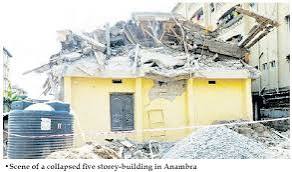Less than three weeks after a three-storey building collapsed at the Odu-Igbo section of the Ochanja Market in Onitsha, killing no fewer than six people, another five-storey building has collapsed at Basden Street, Fegge, in the commercial city of Onitsha, in Onitsha South Local Government Area of Anambra State.
Unlike before, the issue of building collapse seems to be a recurring one, which results in loss of life and property. The causes of these collapses range from poor construction practices, lack of proper building regulations and inadequate enforcement of existing regulations.
The effects of a building collapse could be catastrophic. They may include the loss of lives, the incapacity of those who were injured in the collapse, the destruction of property, financial losses, the wastage of time and valuable resources and an increase in the number of homeless people, among other effects.
Buildings can collapse due to several reasons. Experts in the construction industry believe that “a structure can collapse due to soil absorbency, poor design; poor quality material or maybe even due to fire or earthquake or Tsunami. The engineer cannot prevent the structure from collapse or failure but can warn the residents and certify that the structure is unfit for dwelling.”
Authorities also say that other reasons that could lead to building collapse include substituting specified materials for substandard ones. Other areas of concern include poor concrete mixes, premature removal of formworks and general poor workmanship; use of substandard materials; and use of substandard blocks from block factories.
In recent times, building collapse has become a recurrent issue in every nook and cranny of Anambra State.
Some of the areas where the incident has been noticed, perhaps often, are the commercial and industrial cities of Onitsha and Nnewi; where most of the buildings are alleged to have been erected without specifications.
In the process, people get various degrees of injuries, lose their lives and goods or are rendered homeless. There are casualties in such incidences as witnessed a few weeks ago when a three-storey building collapsed at Odu-Igbo Market, Ochanja on one Monday night. When the building collapsed, five people died instantly while about 26 people were trapped.
The incident forced Governor Chukwuma Soludo to cut short his programmes to pay an unscheduled visit to the scene. The level of devastation unsettled him.
As if that was not enough, another five-storey building collapsed a week later. This time around, the incident occurred at Fegge. Before the Fegge and Ochanga incidents, the same thing had played out in Nnewi and its neighbouring town of Ozubulu, among others.
In Anambra State, no fewer than 20 people had lost their lives, while several others were hospitalised due to various degrees of injuries.
Such a thing has become reoccurring because it has been said that at least, one building collapses every three months.
Worried about the horrid situation, the Soludo administration has expressed its commitment to tackling the menace; which he described as a preventable tragedy.
He said one of the best ways to confront the anomaly is through tackling the issues of impunity and illegal constructions. He revealed that the collapsed buildings were erected by private developers without the government’s approval.
But, does he have the willpower to carry out his plans to sanitise the construction industry in Anambra State?
Some stakeholders believe that Soludo has the political will to right the wrongs in the state’s construction industry. As a corroboration of stakeholders’ opinions, the governor is said to have already marked some buildings for demolition. The marked buildings, according to him, did not meet the government’s specifications in terms of approval.
Again, the governor has evolved plans to redesign some areas where rock-solid structures would be erected.
He said: “All buildings constructed without proper approval will be brought down henceforth, including structures currently under construction at other markets.
“A comprehensive inventory of buildings in Anambra markets and public places will be conducted.
Markets will undergo integrity tests to identify and remove potentially unsafe structures, and individuals found responsible for illegal construction will face legal consequences.”
He emphasised the importance of prioritising public safety, even as he vowed to eradicate “the impunity and lawlessness” that have enveloped the construction industry. We can’t afford to waste one life because of the greed of a few.”
The Chairman of Ochanja Market, Mr Bonaventure Mmuo told The Nation that all market leaders in the state must adhere to the governor’s instruction. He said the issue of building collapse is giving Anambra State a bad name.
Governor Soludo has instructed the Chairman of Onitsha South Local Government Area, Chief Emeka Orji to begin the demolition of illegal structures in the area. The demolition instruction followed the collapse of a five-storey building in Fegge.
The illegal structures, according to Soludo, belong to the state and not Nigeria Inland Water Ways (NIWA).
In a chat with The Nation, the Secretary of the Hausa Community in Onitsha North and South local government areas, Alhaji Ishawu Imam praised the governor and the chairman for their decision to give them time to move their properties out from the buildings marked for demolition.
“We’re happy with the developmental programmes of the Soludo-led administration. We pledge our continued support to the government,” he said.
The council boss told The Nation that most buildings currently under construction would be subjected to integrity tests to avoid further catastrophe.
He said he would meet with the Chairman of the Physical Planning Board in Awka before the government commences the process.
“Everywhere in Onitsha cannot be market. We have declared war on illegal structures and we shall ensure that the right things are done about building collapse in Onitsha South Local Government Area,” Orji said.
However, the Council for the Regulation of Engineering in Nigeria (COREN) said it would not relent in its effort to curb the menace of quackery in the state and country.
The Chairman of the Council in Anambra State, Victor Meju told The Nation that substandard materials and poor foundation are the reasons for building collapse.
This, according to hi, had claimed many lives in Nnewi, Ozubulu Onitsha and other cities in Nigeria.
He told The Reporter that COREN is collaborating with the administration of Soludo to ensure that those faking engineering practices are stopped.
Meju reeled off some statistics on the number of casualties resulting from building collapse. He said there were three in Nnewi, two in Ozubulu and 11 in Onitsha.
We have heard about a series of deaths as a result of building collapse in the state. Before, it used to be Lagos, but it has become rampant in Anambra.
“In the first week of May 2024, I will lead a campaign in the state concerning building collapse. We have failed in that aspect. We are bringing in young engineers with high technical qualities. Our retired colleagues don’t have the new models anymore.
If you go to many sites, you will see Architects posing as engineers. Those things have to stop,” the COREN chairman said.
He advised prospective builders: “When embarking on such a massive building project, keep behind political, ethnic and religious sentiment and consult the council for proper orientation. When such buildings collapse, they create tension and panic among the residents.”
The Chairman of Anambra State Physical Planning Board, Chike Maduekwe, a lawyer said such things wouldn’t be happening if proper procedures were followed.
During his visit to one of the collapsed sites in Onitsha, Soludo promised that he would ensure that the victims of the collapsed building get justice.
He said: “When investigations are completed, the developer, the chairman of the market and every other person involved in the disaster will be prosecuted and jailed.
“The remaining building under construction by the same developer which is close to the collapsed one will be demolished immediately after rescue operations on the site have been completed.”
On how to stop frequent building collapses, Soludo said that henceforth, the erection of any building in any market in Anambra State must get his approval, or else it will be demolished.
He also said every other existing building must pass through an integrity test.
The major problem any administration faces is selective justice. As Soludo has rolled out his plans for the state, those who are likely to suffer it are the less privileged.
Those the government will descend on are those who have no one to speak for them. Their friends, cronies and associates would be free from any such exercise.
No government works without implementing its policies. The governor has reeled off brilliant ideas to tackle building collapse in the state. How it works out remains a conjecture.










